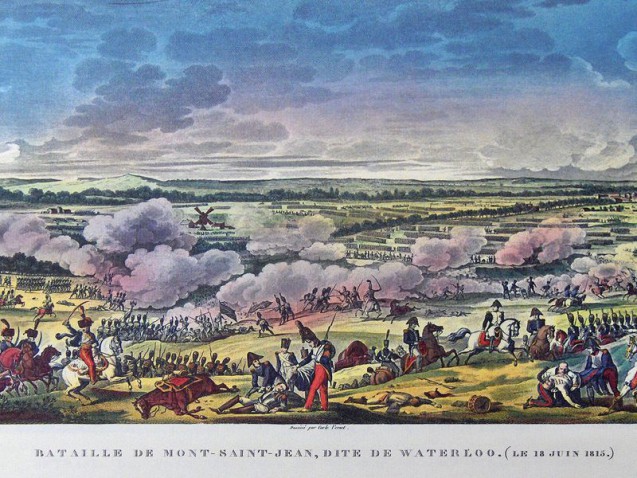 Scientists, as we all know, are there to discover and invent things. But occasionally, you think: “what have they gone and invented now?” If one were to believe the newspapers, it would appear that a researcher has “proved” that the reason Napoleon was beaten at Waterloo was because of a storm, and that this very storm was caused by a volcano 13,000 kilometres away in Indonesia. As simple as that.
Scientists, as we all know, are there to discover and invent things. But occasionally, you think: “what have they gone and invented now?” If one were to believe the newspapers, it would appear that a researcher has “proved” that the reason Napoleon was beaten at Waterloo was because of a storm, and that this very storm was caused by a volcano 13,000 kilometres away in Indonesia. As simple as that.
Now, I’m no vulcanologist, but everyone accepts that volcanos affect the climate. El Niňo proves this, as do the occasional mega-eruptions that have occurred in history. But if you believe the remarkable number of journalists who called us between 25 August and 10 September (traditionally the newspapers’ “Silly Season”), Napoleon himself was the victim of just such a phenomenon, precisely on 18 June 1815, on the fateful “mournful plain”. We are told that a senior lecturer in Earth and Planetary Science, Matthew J. Genge from Imperial College, London, in the journal Geology*, has “demonstrated” that the notorious storm which took place on the night of 17/18 June (and which forced the Emperor to begin the battle later than he would have liked) was caused by a volcanic eruption that had taken place in April on the island of Sumbawa in Indonesia.
This eruption is in fact very well-known and has been much studied. The volcano named Mount Tambora erupted on 5 April 1815, projecting lava, ash and toxic fumes up to 33 km high – so far, so ‘good’. Except that the main eruption has been estimated at 10,000 times (that’s right, 10,000 times) more powerful than the blast at Hiroshima. Result: circa 100,000 deaths and the short-circuiting of the ionosphere, ultimately leading to a pulse of cloud formation across the planet and the disturbance of the climate. And so, if we are to believe the story, two months later, precisely at this particular point in Western Europe, a storm burst, precisely at the moment when Napoleon was about to give the redcoats a good drubbing!
I’m not doubting that Mr Genge is quite serious – though that being said, I don’t know him and I haven’t read his article*, like (I’m sure) 95% of the publicists who wrote on this subject -, but I bet that he never wrote this and that, like all good scientists, he put conditionals, added inverted commas, and gave a prudent discussion of probabilities.
This was not how French commentators behaved. Not only did they comment, some of them even went further than the researcher himself.
As for the climate disturbance caused by Tambora, there’s no doubt about it whatsoever: on the Indian subcontinent, the monsoon in 1816 was insufficient and that for 1817 was excessive; in Europe spring and summer were hotter in 1816; China was also affected, etc. As a result of cereal crop failures and the consequent famines, the volcano indirectly affected millions. It has been proved, and there are twenty general-public science books on the subject, none of which however made the slightest mention of the storm at Waterloo.
Let’s be serious here, historically speaking. Napoleon was of course slowed down by the storm, but this alone does not explain the defeat. Nor indeed is it at all provable that the storm was caused by the volcano. The volcano is supposed to have taken months to have had consequences on the nearby region and then on the European continent, but at the same time it is said to have affected the region around Brussels immediately! It would appear to be only a small step from history to amateur weather prediction. Amazing what bored journalists can write during the Silly Season…
Anybody who’s been to a few of the 18th of June re-enactments at Waterloo knows that there’s more than an even chance of a shower, and sometimes a lot more. It rains, in June, round these parts, when it gets too hot. And it rained on 18 June 1815, getting in the way of the French dawn attack. At the same moment, Blücher was getting going. But of that, volcano or not, Napoleon had no idea whatsoever.
Thierry Lentz, historian, director of the Fondation Napoléon
(September 2018, translation PH)
* Electrostatic levitation of volcanic ash into the ionosphere and its abrupt effect on climate


